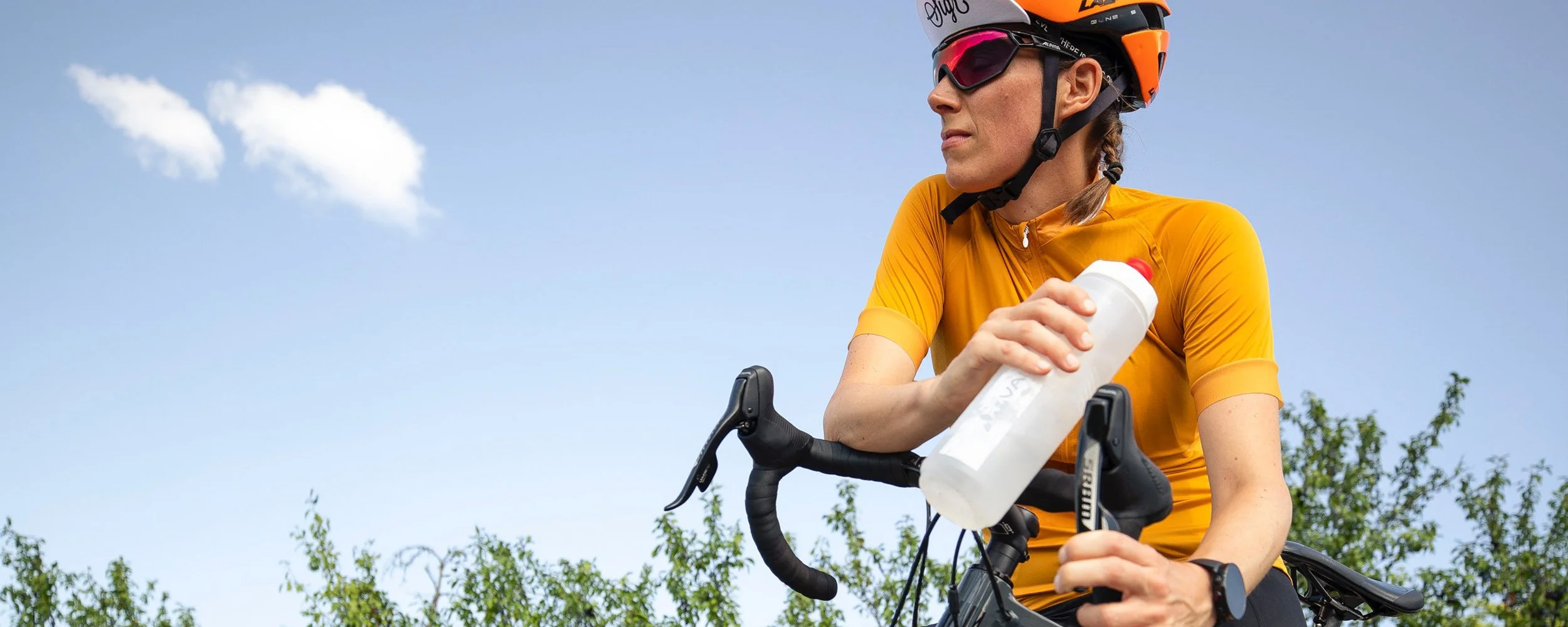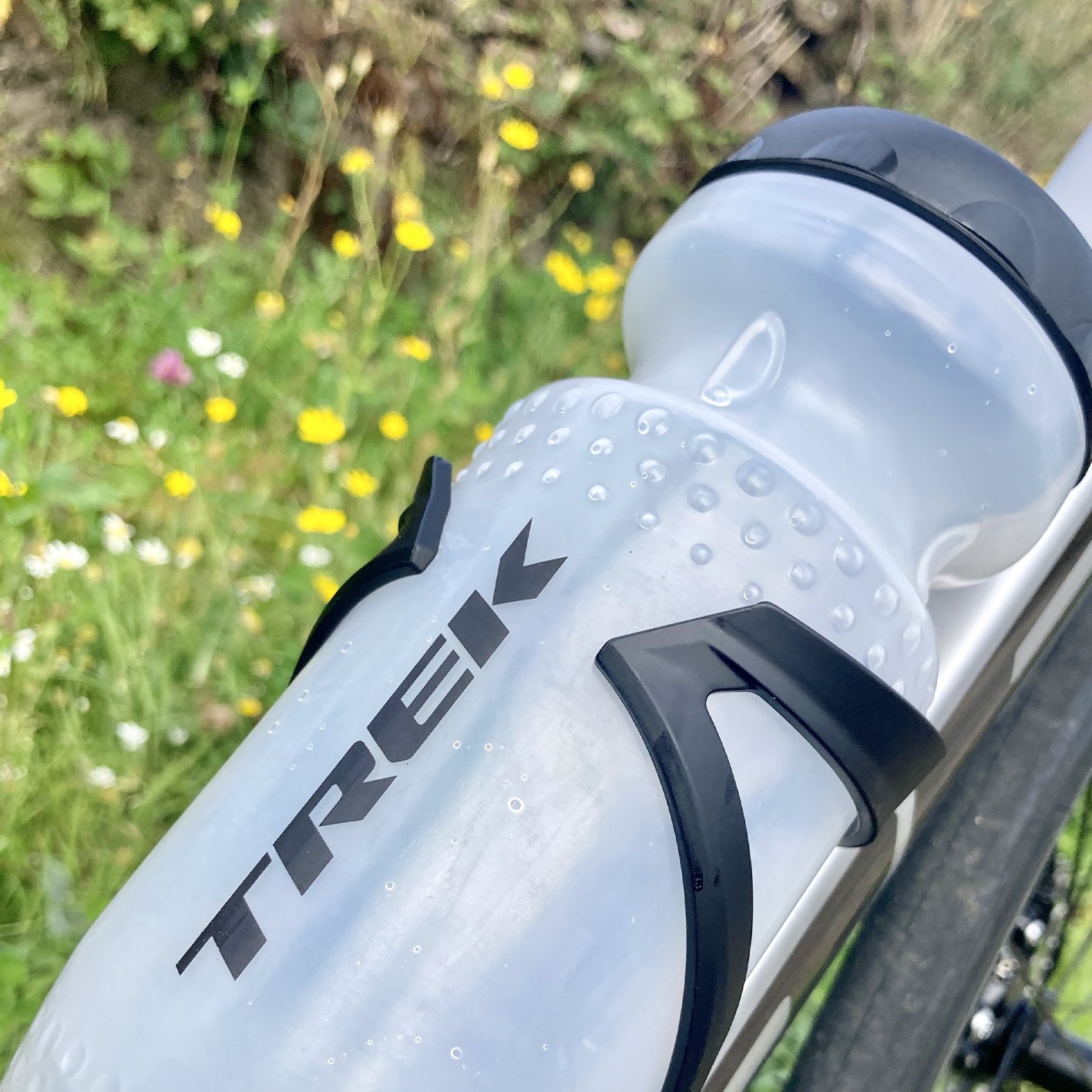Why is hydration important for cyclists?
Whether you are training, riding a Grand Fondo, hitting the trails, or racing enduro, hydration is crucial for your performance and health.
The importance of hydration is usually just associated with the summer, as that is when your body will sweat the most to keep its body temperature under control, but you should be keeping an eye on your hydration whatever the weather, and whenever you swing that leg over your bike.
The effects of dehydration for any cyclists, whether you’re a roadie or a mountain biker, can’t be stated strong enough. Your hydration level influences your blood plasma volume. When you are dehydrated the plasma volume decreases, which in turn decreases cardiac output and sees an increase in body temperature. What this all means in simple terms is that you won’t be able to produce the same power as when you are hydrated, you will slow down, and obviously these effects become even more significant for those that ride long endurance events.
“You’re so dehydrated I can hear you blink!”
The solution for cyclists to avoid dehydration, you would think, would be to simply drink more water when riding, but it’s a little more complicated than that. When you sweat you are not just losing water, you are losing minerals such as sodium, potassium and magnesium, and you’re burning calories in the form of carbohydrate and glycogen. Simply replacing all the lost fluids from cycling with just water alone can lead to hyponatremia.
Hyponatremia is an electrolyte imbalance that occurs when sodium levels in the blood are too low.
Potentially this can be dangerous and deadly. But with the right hydration strategy, you can ensure you are drinking enough of the ‘right stuff’, avoiding dehydration and avoiding an electrolyte imbalance.
What you need to be aware of is that there is no perfect one size fits all hydration strategy, there is a huge amount of variability from rider to rider. The important thing is figuring out what works for you and not getting too bogged down with what other people do.
Discussing hydration strategies is a blog post on its own, maybe that will be the next one. But for now lets’ get back to why hydration is critical for cyclists.
There’s several reasons but I’ve narrowed it down to these five key points, in no particular order.
Performance
Hydration is crucial for optimal performance on the bike. Dehydration can lead to fatigue, reduced endurance, decreased power output and poor concentration. In fact studies have shown that a 2% drop in bodyweight due to sweating will have significant effect on performance - for an 80kg rider that’s around a 1.6kg drop in weight. 4% will decrease your aerobic capacity. At 5% heat exhaustion can become a major problem with your work capacity dropping up-to 30%. That’s a huge loss in performance. If you hit 7% you may start hallucinating, and if that’s not enough, at 10% heat stroke, circulatory collapse and even death can become real possibility.
Regulation of body temperature
Cycling can be a strenuous activity, whether you’re training indoors, smashing those hill repeats outside, or just out for a ride with the family, your body will always generate heat regardless of the weather. Sweating is the body’s way of cooling down which is why it’s essential to replace those fluids lost through sweat to prevent overheating. Drinking plenty of fluids before, during, and after your ride can help regulate your body temperature and prevent dehydration.
Preventing the onset of cramp
If you’ve suffered from cramps before you know how painful they can be. On a bike they feel 10 times worse and can massively interfere with your cycling performance. For such a common occurrence it may surprise you to know that the exact reason for cramping is still unknown. Some studies show that inadequate hydration or electrolyte levels are to blame, and others show that isn’t always the case. Anecdotal evidence suggests that regular stretching can help prevent cramp in muscles that are prone to it. If you regularly suffer from cramps I’d suggest an approach of cover all your bases. Stretch, drink water, consume a carbohydrate sport drinks and possibly look at supplementing with some vitamins and minerals to avoid an electrolyte imbalance. Many sports drink will contain all the appropriate vitamins and minerals that you lose through sweating.
Improved recovery
Adequate hydration is essential for post-workout recovery. It helps to replace fluids lost during exercise, and it’s also critical for the delivery of nutrients and oxygen to the muscles. It also helps prevent muscle damage, whilst maintaining muscle function, and can reduce muscle soreness by helping to flush out lactic acid and other waste products that accumulate in the muscles during exercise. All of which can help speed up and improve recovery time.
Health
Water is essential for a number of important process to take place in the body. Processes such as our blood carrying glucose, oxygen and nutrient to cells. The kidneys getting rid of waste products that are no longer needed. Lubricating our joints and eyes. Helping our digestive system function correctly. Fluid in the body is vital for all these processes to occur, even the slightest drop in levels and we feel the consequences. If our fluid levels are low it can cause headaches, dizziness, lethargy, and poor concentration, all signs of dehydration. Over a longer period of time dehydration is associated with constipation, urinary tract infections and the formation of kidney stones.Good hydration is simply too critical for our health to ignore. Especially if you want to keep your body performing at it’s best when on the bike.
Summary
As you should now understand water is essential for our bodies to function. They depend on it to survive. It’s crucial for many reasons, such as, to regulate body temperature, keep our joints lubricated, prevent infections, deliver nutrients to the cells, and to keep our organs functioning properly.
Drinking enough of the right fluids during cycling will also contribute to your overall health and well-being, which in turn will have an impact on your cycling performance.
It’s great that you cycle to keep your body fit, but with out a solid hydration strategy you may still suffer severely from dehydration. Think about having a drink when you stop at traffic lights, before you attack a technical climb, or whilst you’re waiting on a trail for your mates to catch up. Even better factor in a cafe stop into your rides, especially if you’re out all day.
Stopping at a trailhead is a perfect opportunity to top up your hydration levels.
Always carry at least one bottle on your bike, even if you carry a hydration pack.
Just make carrying water (and hydration tablets) the bare minimum, whether it’s a bottle or two on your bike, or a hydration pack if you’re out in the hills all day. It should be part of your essential kit list. Especially in this current heat wave.
A little knowledge and a lot of common sense are really all you need to ensure you are sufficiently hydrated for your bike rides.
Don’t be that person who turns up with nothing!



